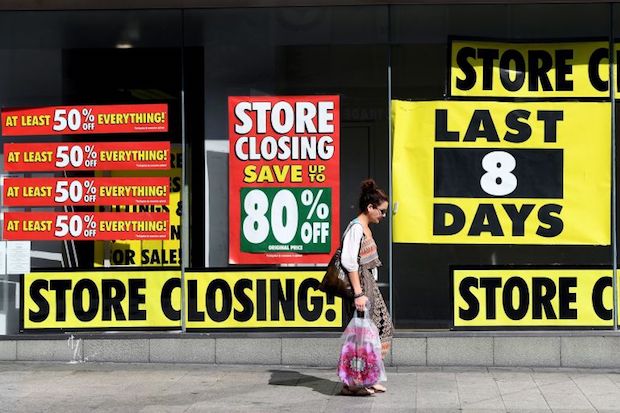If you care about your local community, you can’t help but feel disheartened at the sight of a closing store. Vacant shops on a once-busy high street are, in a word, depressing. So too are the words, practically screaming at you in block capitals, ‘EVERYTHING MUST GO’.
But these are increasingly familiar sights. With the collapse of House of Fraser, Toys ‘R’ Us and Maplin among others, the phrase ‘retail apocalypse’ has gained ever-greater potency. Last week, two reports painted an even grimmer picture. PwC found 1,123 stores had disappeared from Britain’s top 500 high streets in the first half of the year. And the Local Data Company recorded the number of new shops, restaurant and leisure openings fell to 19,803 over the same period—leaving 4,402 more gaps on the high street.
These factors have played their role in the transformation of the high street. But we have failed to consider what might be the most important point of all: that, for years, the high street has not been performing its function. Put simply, high streets don’t serve their communities.
Few have failed to notice their high streets changing. Plenty of column space has been given over to discussing the roots of this crisis, the trend towards e-commerce and oppressive business rates being the prime suspects. Here Amazon, which pays almost nothing in corporate taxes yet dwarfs its physical rivals in sales, has a lot to answer for. Lowering rates for small businesses would not be nearly as effective as ensuring big tech companies pay their fair share.
The high street is not just a row of shops, it should be at the heart of a community; a place people go to connect, explore and discover. But too many high streets have become boring. They have lost their vibrancy and their relationship to the people they serve. They often now appeal only to the narrow interests of stakeholders and shareholders and not to the broader interest of the community. They have become indistinguishable from one another – tired identikit chains whose product offerings are easily replicable online.
Landlords aren’t playing their role. By ignoring independent brands and encouraging the same kinds of established businesses to fill space, they’re perpetuating a failing system. By failing to take risks and give people what they want, brands aren’t playing their part either. But to replace empty retail stores with new houses or offices—as some have suggested is the best course of action—is to condemn the high street to irrelevance. And it would be a profound mistake: what we need instead is to remind ourselves of the true function of retail in the modern age, which is to offer consumers experience and intimacy. It’s no coincidence that the stores still thriving are barbers, florists and beauty salons—places where experience and interaction is part of the product.
Clearly local government, as well as landlords and businesses, must be adaptable. That means making space available, accessible and barrier-free to entrepreneurs of every stripe. This would solve the problem of unfilled space, and allow anyone, anywhere to bring their idea to life. We’ve already seen this in action. The graffiti artist Mr. Doodle went viral after he took a shop for a week and covered it with doodles; in New York, a man playing Bach for five hours a day rapidly built a dedicated following. Alex Hely Hutchinson used temporary space to trial her ‘26 Grains’ porridge shop; now she has a permanent store in Covent Garden. Netflix took over Old Street station to promote the release of Black Mirror, creating a ‘surveillance monitoring room’ in East London.
The possibilities are almost limitless. And it bears remembering that not long ago, you would have to rent store space for ten years. Now you can appear today and go tomorrow. Appear Here alone has opened 4,500 new stores in London this year—more than have closed. A solution, then, exists. And what we’re witnessing in the form of pop-up shops are a glimpse of how the high streets of the future might look. These stores are defined not by what they sell, but by the experience they promise. And the opportunity isn’t just in experiences. As online advertising becomes more expensive, businesses are waking up to the power of a high street space as a window into their brand. Increasingly taking short term space is the most cost effective way to advertise.
There is absolutely no reason why there should be empty shops in Britain’s high streets. And there won’t be, so long as we push for a new, common vision for retail and an uncompromising stance on the big companies that upset the balance. The ‘new’ retail must be defined by flexibility and relevance to the needs and wants of communities. People are happy to spend—in fact, they are spending more than ever. But they are spending on travel and entertainment. And if retail can redefine itself, so that it puts experience, originality and intimacy above mere consumerism, it will flourish again.
Ross Bailey is CEO and Founder of Appear Here






Comments